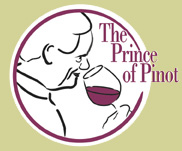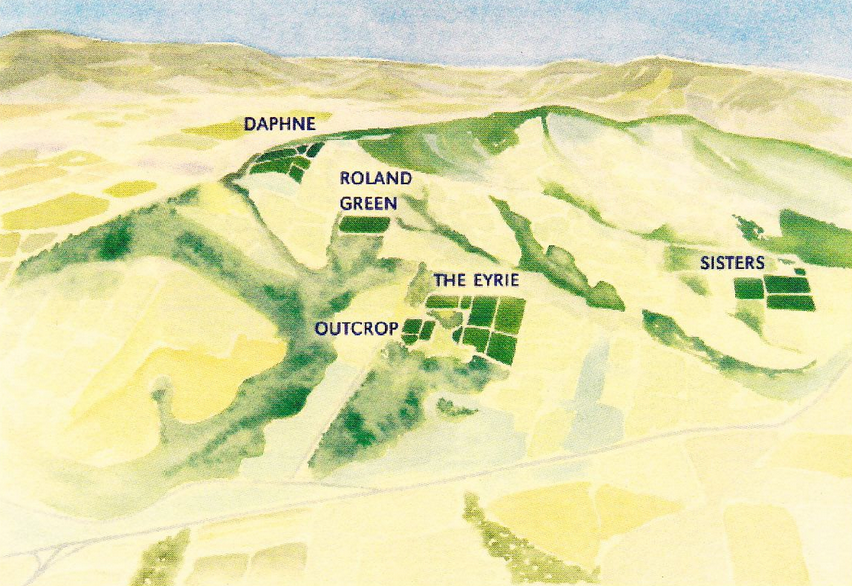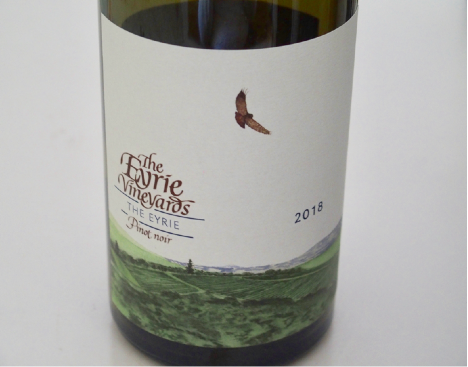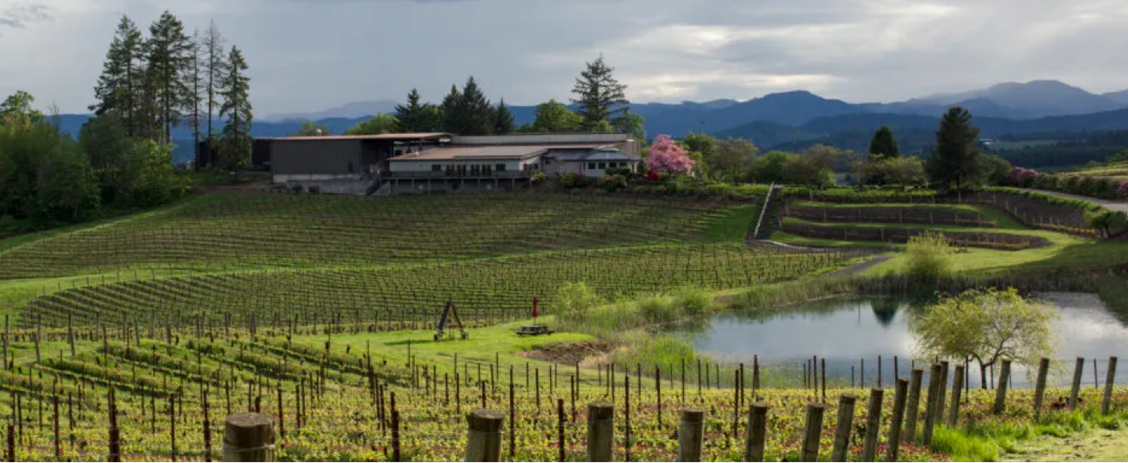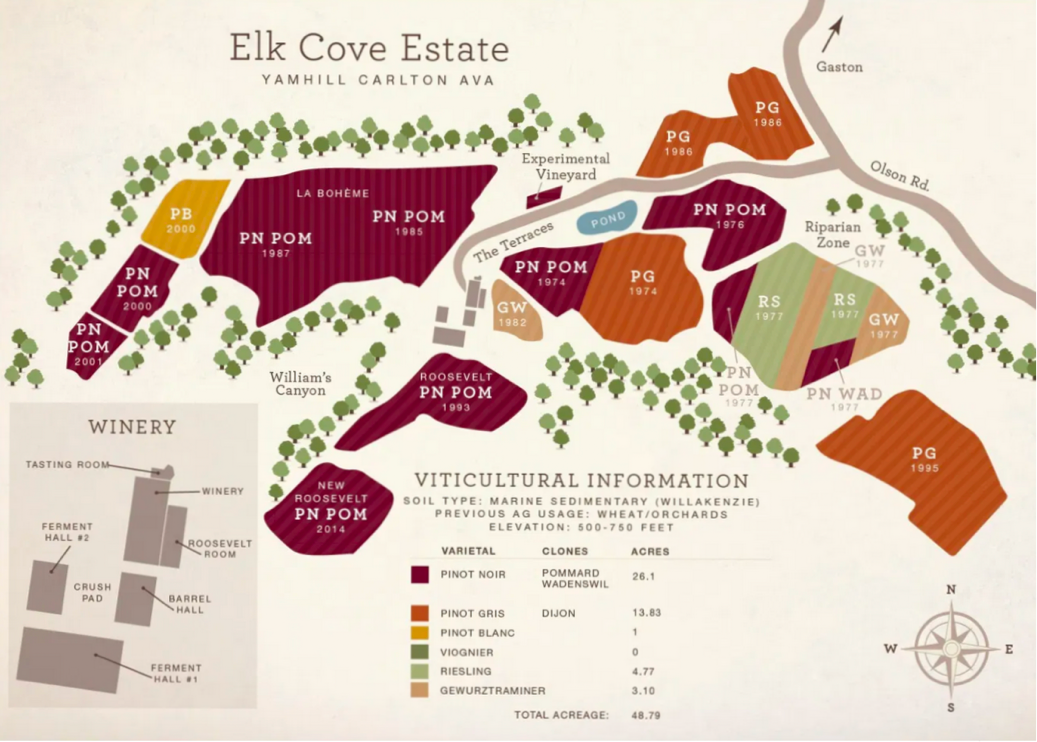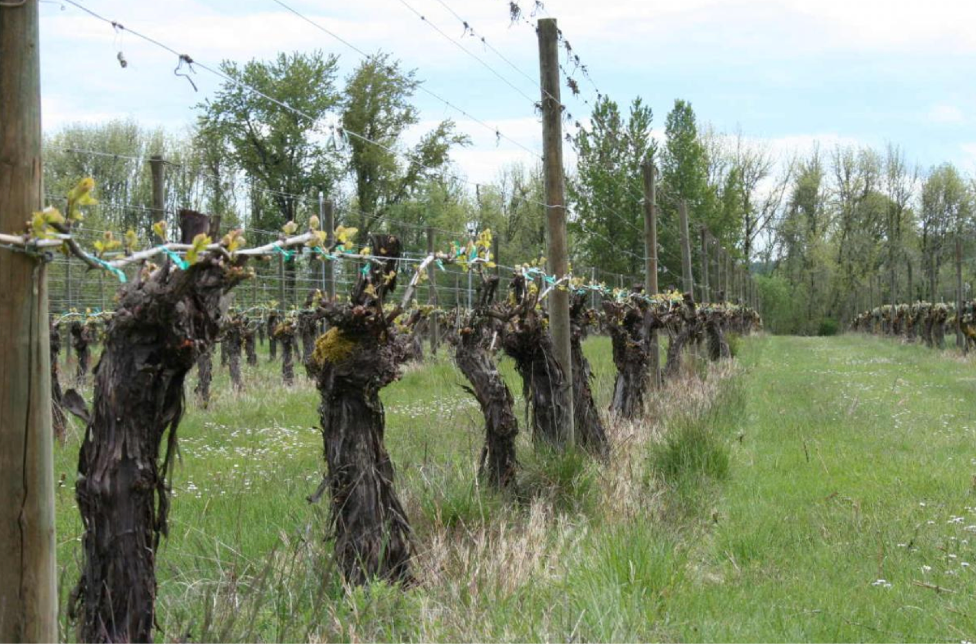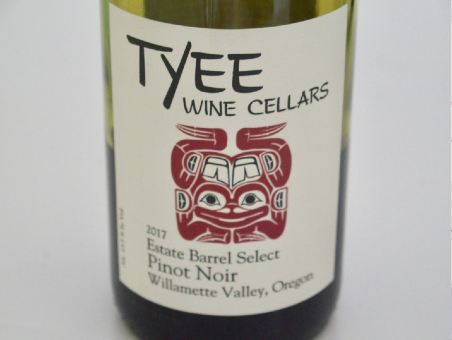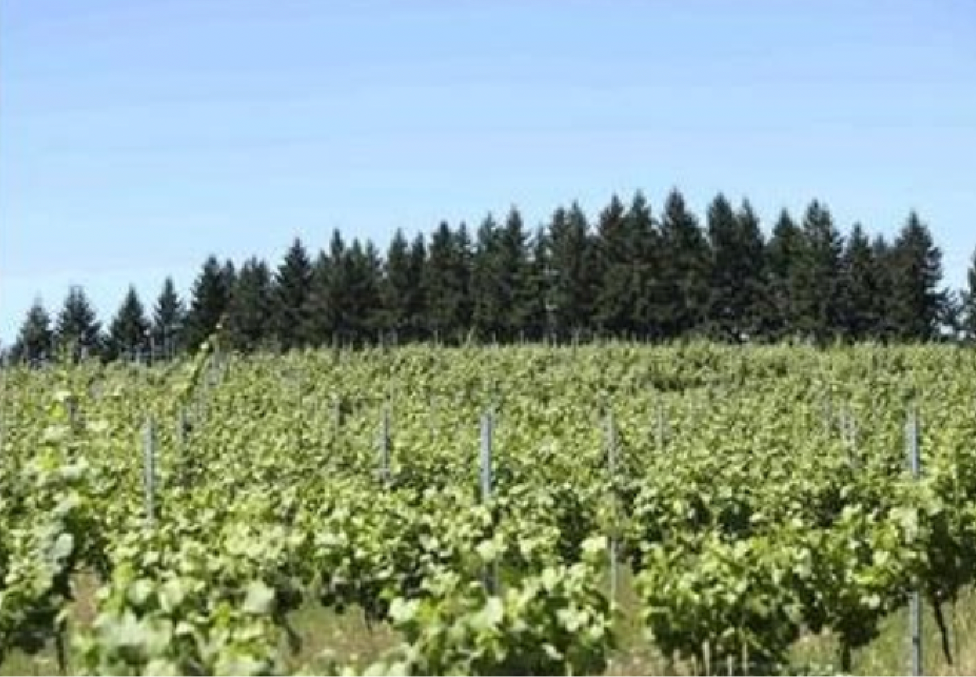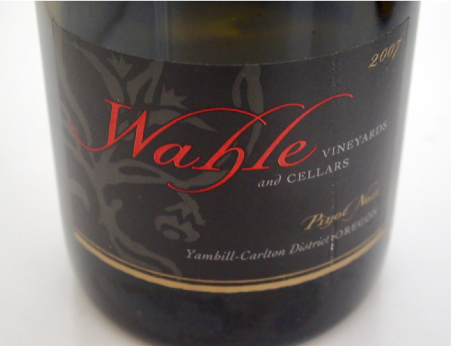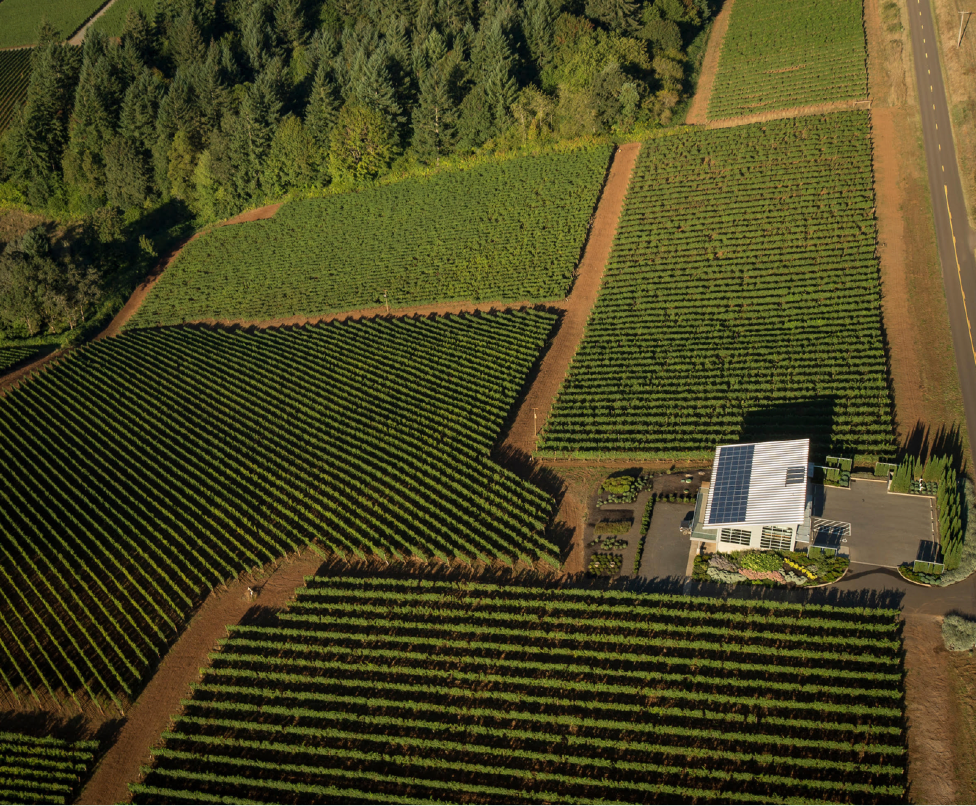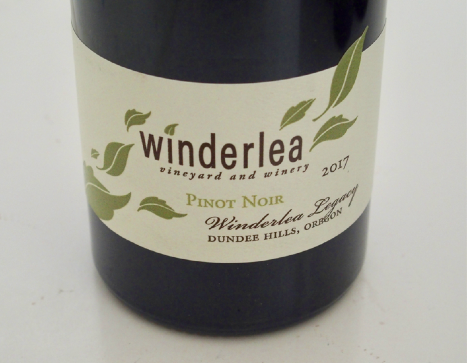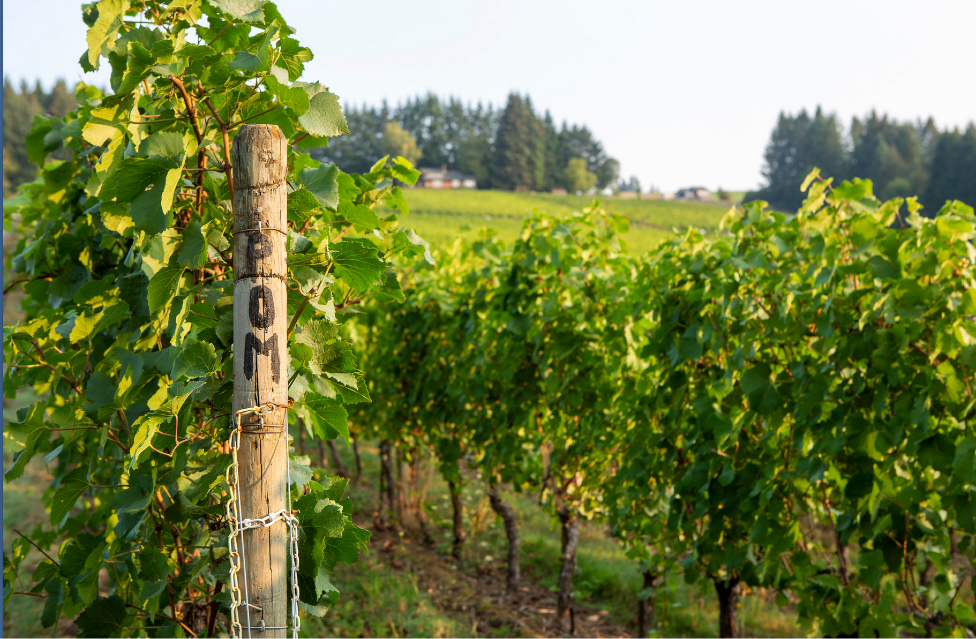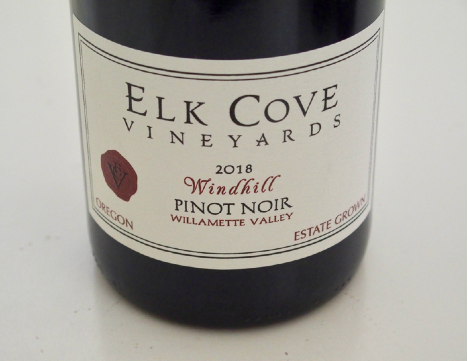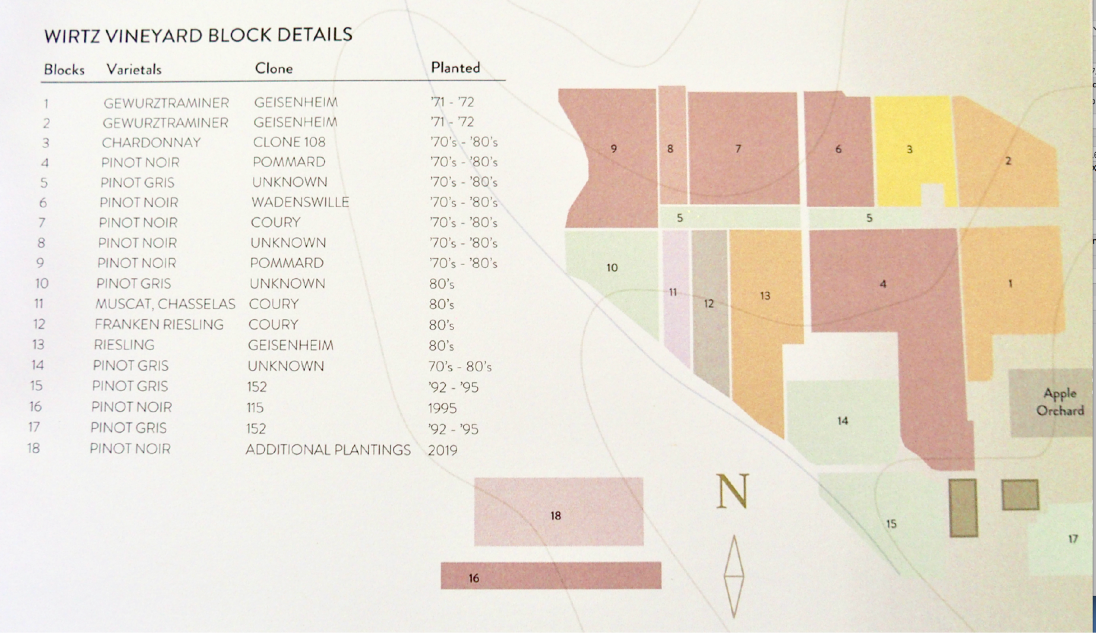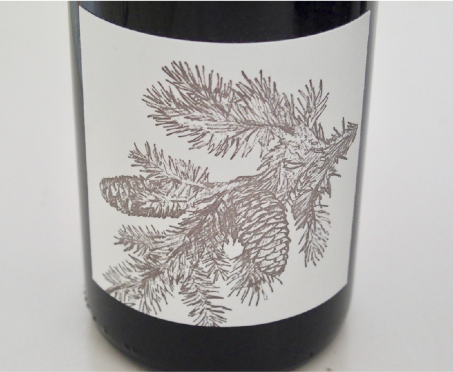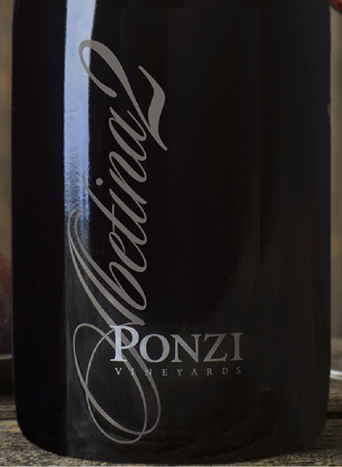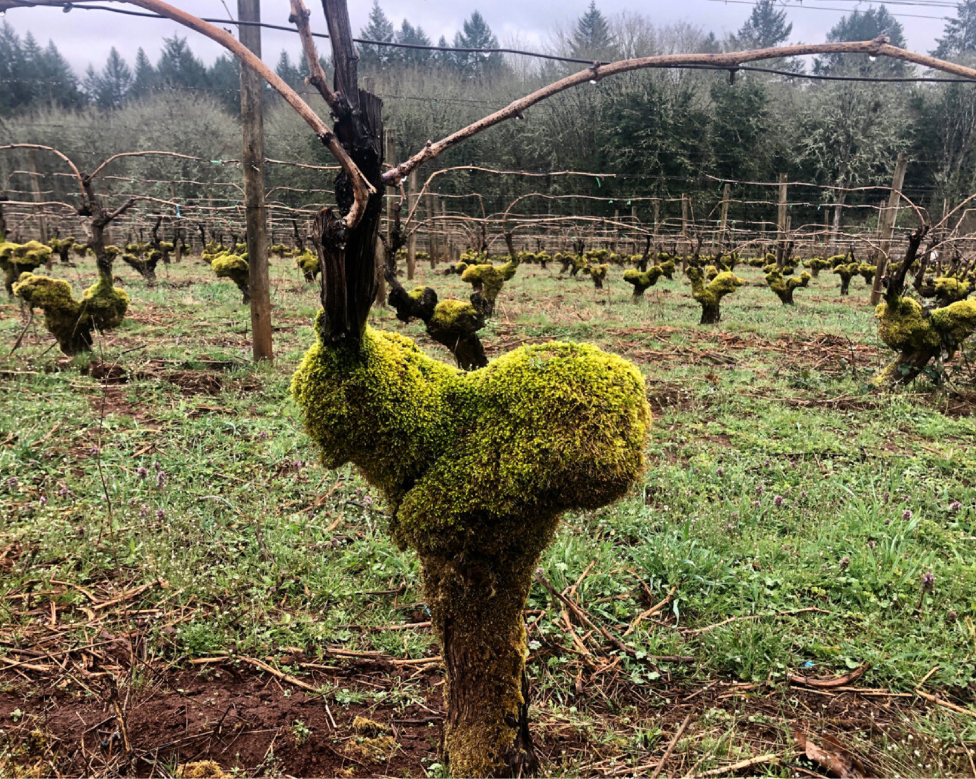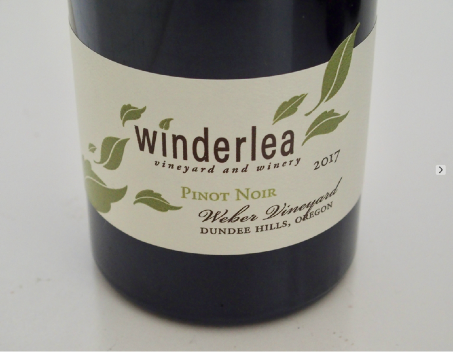Vineyards Established 1974-1975
1974
Daphne Vineyard
The Eyrie Estate Vineyards
Owner: The winery was founded by David and Diana Lett in 1965. Son and winemaker Jason Lett took over
management in 2005. David passed away at the age of 69 in 2008.
Location: Dundee Hills in the Dundee Hills AVA.
Planting: Own-rooted Pommard 5 was planted originally in 1974. 1.5 acres of the original plantings are still in
production. Currently, the vineyard consists of 13 acres: 1.5 acres of Pinot Noir, mostly Pinot Gris, and some
Pinot Meunier. Daphne is one of the oldest and highest vineyards in the Dundee Hills.
Pinot Noir scion: Own-rooted Pommard
Soil: Volcanic Jory and Gelderman. Very shallow, averaging less than 10 inches on top of large boulders.
Vines: South, east and west facing, 820’ to 900’’ elevation at the peak of the Dundee Hills about 400’ above
the original plantings of The Eyrie Vineyard. Because of the high altitude, There is considerable wind exposure.
Due to the harsh conditions, the vines are short and bonsai-like. The vines are cane pruned with 9’ x 5’
spacing. Daphne is the last of the Eyrie single vineyards to ripen with tiny clusters.
Farming: Regenerative, with no-tilling. Organically certified since 2013.
Winery clients: None, a monopole.
Old vines bottling: The Eyrie Vineyards Daphne Pinot Noir is produced with a small amount of grapes
going into the Estate Pinot Noir. This wine has not been produced in every vintage, for example, not in
2002-2007, 2010, and 2011.
Of interest: Daphne is one of five estate vineyards at The Eyrie Vineyards estate. It was originally called
Stonehedge but later named Daphne after a dear, long-time friend of the winery. David Lett produced a Daphne
Vineyard Pinot Noir from the 2001 vintage but did not like it. He did not release it until years later when it was
sold to wine club members and the rest sits in the winery’s library. Jason Lett worked his first vintage in 1973
and continued to work in the vineyards and winery throughout his youth. Today, he oversees all facets of wine
production and the business. Diana Lett, Eyrie’s co-founder, still is actively involved in the winery's operations and events.
2016 The Eyrie Vineyards Daphne Vineyard Dundee Hills Pinot Noir
13.0% alc., $80.
·
Moderate garnet
color in the glass. A complex nose offering aromas of red cherry, graham, cardamom, and marijuana. The lean
flavor profile is dominated by red cherry, cranberry, and what I can only describe as grassiness and dried green
herbs. Generous acidity, integrated tannins and a savory rather than fruity finish. Unchanged when sampled
the following day from a previously opened bottle.
Score: 89
2018 The Eyrie Vineyards Daphne Vineyard Dundee Hills Pinot Noir
13.0% alc., $85.
·
Moderate garnet color in the
glass. Aromas of black raspberry, red rose, dried herbs and
toast. A harmonious, gracious and polished wine with flavors
of raspberry, cherry and plum framed by brave tannins and a
good cut of acidity. There is a savory herbal thread in the
background. The finish is exceptionally long. Still engaging
when sampled two days later from an opened bottle.
Score: 93
Elk Cove Estate Vineyard (Elk Cove Heritage Site)
Elk Cove Estate
Owners: Elk Cove Vineyards was founded by Pat and Joe Campbell in 1974 and is now owned by their son
Adam Campbell.
Location: Northern Willamette Valley in the Yamhill-Carlton AVA.
Planting: The original plantings of 5 acres of own-rooted Pommard date to 1974. 45 acres of Pinot Noir have
been added beginning in 1976 as well as Riesling, Gewürztraminer and Chardonnay (since grafted over to
Pinot Gris). See map below.
Pinot Noir scion: Own-rooted Pommard
Soil: Marine sedimentary Willakenzie.
Vines: South-facing with steep slopes. One of the higher vineyards in Oregon, reaching an elevation of 750’.
Winery clients: None, a monopole.
Old vine bottlings: Three generations of Pommard clone are represented on the Elk Cove Estate with the two most recently planted vineyards
employing selection massale. La Boheme vineyard was planted in 1985 and 1987 using cuttings from the best
1974 Pommard vines. A second estate vineyard, Roosevelt Vineyard, was initially planted in 1993 using a
selection of the best Pommard vines from La Boheme Vineyard. The winery’s Elk Cove Reserve Pinot Noir
has contained contributions from La Boheme and Roosevelt vineyards as well as other Elk Cove vineyards
including the original Elk Cove Heritage Site.
Tyee Estate Vineyard
Tyee Estate Vineyard Pommard vines dating to 1974
Owners: Fourth generation Buchanans, Dave and Margy Buchanan.
Location: The estate vineyard is on the scenic Buchanan Family Century Farm founded over 130 years ago
in Corvallis.
Planting: The Buchanans planted the first vines in 1974 including Pinot Noir, Pinot Gris, Chardonnay and
Gewürztraminer, all own-rooted. The current total Tyee Estate Vineyard has 3 acres of own-rooted Pinot Noir
planted over the years 1974, 1981, 1985 and 1989. Pinot Noir on grafted rootstock was planted in 2000 (115,
777 and Pommard on resistant rootstock) and 2014 (114, 777, and Pommard with grafts from some of the
favorite old vines). for a total of 14 acres of Pinot Noir. Another 4 acres is planted to Chardonnay, Pinot Gris and
Gewürztraminer.
Pinot Noir scion: Own-rooted Pommard.
Soil: Willamette silty, clay loam.
Vines: South-facing slope at the first terrace of the valley floor. Spacing is 10’ x 4.5’ with mixed shoot and
Scott Henry trellis.
Farming: Certified Salmon-Safe. A diverse, perennial cover crop under the vines sequesters carbon and
prevents erosion. Nearby creeks are protected with native riparian buffers. Only minimal amounts of organic
spray are applied to the grapes and organic compost is used for fertility. Dry-farmed and no-tilling.
Winery clients: None, a monopole.
Old vines bottlings: The winery’s featured Pinot Noir wines are the Tyee Estate Pinot Noir and the limited
release Tyee Estate Barrel Select Pinot Noir. The Estate Pinot Noir is composed of newer and old vine
Pommard clone and Dijon clones. The Estate Barrel Select Pinot Noir is 100% Pommard clone made from a
combination of own-rooted Pinot Noir vines that are 25 to 47-years old, and newer plantings that include the
winemaker’s favorite barrels of the vintage. The wines of this heritage and quality are rarely this affordable.
Of Interest: Tyee Wine Cellars was founded in 1985. The vineyard manager and winemaker is fifth-generation
Willamette Valley farmer Merrilee Buchanan. Tyee is a northwest word meaning “chief” and “best.”
2017 Tyee Wine Cellars Estate Willamette Valley Pinot Noir
13.5% alc., $20.
·
Moderate garnet color in the
glass. Enticing aromas of black cherry, cola, tutti-fruity, and a floral lift. The bold flavors of black cherry, ripe
strawberry, spice, cola, and black tea are sturdy on the palate and make quite an impression. Instantly
enjoyable, with easygoing tannins and a seamless, very long finish.
Score: 93
2017 Tyee Wine Cellars Estate Barrel Select Willamette Valley Pinot Noir
13.5% alc., $30. Whole berry and whole
cluster fermentation. Bottled unfined and unfiltered.
·
Moderate
garnet color in the glass. Pleasing aromas arrive over time in
the glass including blackest cherry, blackberry, burnt tobacco
and potpourri. Striking mid-weight plus flavors of black cherry
and blackberry framed by sturdy but well-proportioned tannins
that contribute to the harmony. An unbelievably long finish is full
of sweet Pinot extract. Even more terrific when tasted two days
later from a previously opened bottle. Drinkable now, but
cellaring will bring more rewards.
Score: 95
Wahle Estate Vineyard
Owners: Dr. Mark Wahle’s family grew up on one of the first commercial vineyards in the Willamette Valley
and the first in the Yamhill-Carlton region. The current owner is Mark and Shaghayegh Wahle.
Location: On a 100-acre hilltop site outside of Yamhill in the Yamhill-Carlton AVA.
Planting: The Wahle family planted a 6-acre vineyard initially in 1974 with 3 acres of the original plantings
remaining. This was the first commercial vineyard in the Yamhill-Carlton District.
Wahle Vineyard
Pinot Noir scions: Own-rooted Pommard, Wädenswil and Coury sourced from Coury’s nursery and included
a large planting of the Coury “Pommard”. Of the initial Coury “Pommard” 1.3 acres planting, there are now close
to 0.9 acres remaining. The initial planting also included an Upright Pinot variety., Chardonnay and smaller
amounts of Gewürztraminer and Sauvignon Blanc. The Wädenswil vines and much of the Upright Pinot
dwindled in recent years and were removed. A small block of the Upright Pinot remains and is unexplainably
thriving. Some Chardonnay has been grafted to Dijon 777. The main blocks from the 1970s that remain are
Coury “Pommard” and the 777. The current total acreage is about 32 acres.
Soil: Sedimentary Willakenzie.series.
The vineyard is primarily south to southwest-facing at 450’ elevation. Mostly 8’ x 6’ spacing with the
initial trellis having a 2’ x 2’ post at each vine.
Farming: Dry and no-till farmed.
Winery clients: None for Pinot Noir.
Old vines bottlings: A Wahle Yamhill-Carlton Pinot Noir (2017 vintage, $45) was produced containing a
majority of Coury “Pommard” and a smaller fraction of old vine Chardonnay grafted to 777.
Of interest: Dr Mark Wahle is a 1988 graduate with a degree in enology from UC Davis as well as a working
emergency room physician in Portland. He and his spouse also own a 310-acre site in the Eola Hills known
as Holmes Hill Vineyard. Mark crafts his wines at The Carlton Winemakers Studio.
2007 Wahle Vineyard & Cellars Yamhill-Carlton District Pinot Noir
13.4% alc. Sourced from the initial plantings
established in 1974.
·
Moderate light garnet color with slight
bricking of the rim in the glass. The aromas of black cherry,
exotic spices, lavender and graham are pleasant but fleeting.
The wine has an aged patina with mid-weight fruit flavors of
black cherry and blackberry with a floral perfume. Very suave
with completely resolved tannins and juicy acidity. An
impressive wine especially since 2007 was not a great Oregon
vintage, but only for a short time after opening as later the wine
faded out with oak coming to the forefront. From my cellar.
Score: NR
Red Hills Vineyard/Goldschmidt Vineyard/Winderlea Vineyard
Aerial photo of Winderlea Vineyard. The blocks to the left (east) of the tasting room
and the block to the right are the original blocks planted in the 1970s
Owners: Dr John and Sally Bauer purchased a 15-acre filbert farm in the Dundee Hills in 1974. They bought
another 5 acres of a recently-planted vineyard from Jim McDonald in the mid-1970s and another 5 acres from
the Jones family. The Red Hills Vineyard property was sold in 1999 to former Oregon Governor Neil Goldschmidt and named Goldschmidt Vineyard. The vineyard was sold to Bill Sweat and Donna Morris of
Winderlea Vineyard & Winery in 2006.
Location: On the south side of Worden Hill Road in the Dundee Hills AVA.
Planting: The available information on the initial planting at Red Hills Vineyard is unclear. Reportedly, 10 acres
were planted in 1974 and another 5 acres in 1975. Chardonnay was grafted over to Dijon 115 at some point
years later. Donna Morris told me there were 3 blocks of approximately 3 acres of own-rooted Pinot Noir
planted in 1974-75 and these vines, along with some old-vine Chardonnay grafted over to Dijon 115 are the
source of the Winderlea Legacy Pinot Noir.
Pinot Noir scions: The initial planting included both own-rooted Pommard and Wädenswil clones as well as
Coury selection Pinot Noir along with Chardonnay, Riesling, Cabernet Sauvignon. and Merlot. The source of
the scions was was Charles Coury
Soil: Volcanic Jory.
Vines: Original vines had 10’ x 8’ spacing but interplanting has occurred. Vines are oriented north-south with
southwestern exposure at 320’-580’ elevation.
Farming: Biodynamic farming since 2009 and Demeter Biodynamic Certified® in 2015.
Winery clients: In the early 1980s, grapes were sold to Elk Cove, Erath, the Eyrie Vineyard, Rex Hill and
Lange. Winderlea has no winery clients for Winderlea Estate Vineyard which is now a monopole.
Old vine bottling: Winderlea Legacy Winderlea Vineyard Pinot Noir.
The entire 16-acre Winderlea Estate Vineyard consists of 13 different blocks entirely devoted to
Pinot Noir and includes many high-density Dijon clones in addition to the old Pinot Noir vines.
2010 Winderlea Legacy Winderlea Vineyard Dundee Hills Pinot Noir
13.2% alc., $75. (Reviewed in 2012 - “an
aristocratic wine with upscale aromas, intensely fruity palate and citrus-infused acidity.”)
·
Moderately light
garnet color in the glass. A complex nose offering scents of dark red cherry, strawberry, underbrush, rose petal
and dried herbs. Light to mid-weight in style, with flavors that echo the nose. An arrow of acidity runs through
that is uplifting. The tannins are resolved, and the lip-smacking, long finish is replete with intense cherry
goodness. The wine is best upon opening and llater showing its age so drink up.
Score: 93
2017 Winderlea Legacy Winderlea Vineyard Dundee Hills Pinot Noir
12.5% alc., 291 cases, $85. Aged 10 months in
French oak barrels, 3% new.
·
Light garnet color in the glass.
Aromas of lean cherry juice, white pepper, salad greens, and a
touch of oak. Light in weight with an array of demure red fruits.
Bashful, yet showing good harmony, and a fairly long ,
quenching finish imbued with fine-grain tannins. Extremely
elegant.
Score: 91
Windhill Vineyard
Windhill Vineyard old Pommard vines at 2020 harvest
Owners: This vineyard was originally planted by Sanford and Ginny Reese. Elk Cove Vineyards produced a
single vineyard Pinot Noir annually from the vineyard beginning in 1979. In 1996, they purchased the vineyard.
Location: Tualatin Hills AVA in the very northern part of the Willamette Valley (20 miles west of Portland).
Planting: Initially, 3.2 acres of Pinot Noir vines were planted in 1974. There has been no interplanting or
supplemental plantings in the interim. Today, there are 20 acres that include subsequent plantings of Pinot Noir,
Chardonnay, Pinot Gris and Riesling.
Pinot Noir scion: Own-rooted Pommard clone sourced from Charles Coury.
Soil: Laurelwood windblown silt.
Vines: South-facing slopes and mid-level elevation of 500’.
Farming: Sustainably farmed with organic practices since 1999. Vines are dry-farmed.
Winery clients: EIEIO & Company.
Old vines bottling: The Elk Cove Vineyards Windhill Vineyard Pinot Noir is produced solely from 4 acres
of the oldest Pommard clone Pinot Noir vines on the property.
2018 Elk Cove Vineyards Windhill Vineyard Willamette Valley Pinot Noir
14.0% alc., pH 3.58, 154 cases, $60.
Harvest Brix 24º. Fermented in small open-top steel
fermenters and aged 10 months in 27% French oak barrels.
·
Dark garnet color in the glass. Engaging aromas of
blackberry, boysenberry, creme soda, and bramble. Midweight
plus flavors of olallieberry and blackberry touched with
exceptional spice. Expansive on the mid palate and the
extremely long finish. Supportive, dusty tannins and welcome
oak with an underlying earthy tone. This wine reminds me of a
delicious olallieberry pie (my favorite).
Score: 95
Wirtz Vineyard
Owners: This vineyard was originally owned and planted by David Wirtz. Milan and Jean Stayanov (David Hill
Vineyards & Winery)) have owned the vineyard since 2019.
Location: Two miles from David Hill Vineyards but a cooler terroir.
Planting: The property was planted initially in 1971-1972 to Gewürztraminer and in 1974 to Pinot Noir. There
were additional plantings of Pinot Noir and other varieties into the 1980s, 1990s and 2019, and the Wirtz
Vineyard now spans 24 acres.
Pinot Noir scions: Own-rooted Pommard, Wädenswil, and an Upright Pinot sold by Coury’s nursery compose
the vineyard's 14 acres of heritage Pinot Noir. There are some red grape vines that are unidentified.
Soil: Laurelwood.
Vines: The vineyard is mostly east-facing with the upper blocks facing south. Vines are cane pruned with VSP
for the trellis.
Farming: LIVE certification. Dry-farmed.
Winery clients: Big Table Farm bottled a vineyard-designate Pinot Noir and Pinot Gris (many past reviews are
in the PinotFile). The last bottling was the 2016 vintage. Now, the vineyard is a monopole for David Hill
Vineyards who bottles a Wirtz Vineyard Pinot Noir, Chardonnay and Pinot Gris.
Old Vine bottlings: David Hill Vineyards & Winery Wirtz Vineyard Pinot Noir. Multiple white varietals are
produced from old vines. Big Table Farm Wirtz Vineyard Pinot Noir (last vintage 2016).
Of interest: Vineyard Manager Mike Kuenz told me the following. “The old vine Chardonnay is super
interesting and pretty certain it is the Draper clone. The origin of the Pinot Gris is unknown but possibly came
from David Lett and is one of the best wines from this vineyard. Other white varieties planted include
Chasselas, Franken Riesling, Gewürztraminer, Muscat, Riesling, Semillon, Sylvaner, Savagnin Rose and Flora
(a Gewürztraminer-Semillon hybrid from Dr. Olmo at UC Davis). Wirtz Vineyard and Schramsberg are the only
known commercial plantings of Flora. Wirtz Vineyard is a super interesting site for whites!”
2015 Big Table Farm Wirtz Vineyard Willamette Valley Pinot Noir
13.9% alc., 368 cases, $48. Bottled unfined and
unfiltered.
·
Moderately dark garnet color in the glass. Inviting
aromas of earth-dusted cherry, cardamom spice, pipe smoke,
and toast. This wine is seemingly at its apogee, featuring flavors
of black cherry, cola and grilled mushrooms. Mid-weight plus in
concentration, with a modicum of suave tannins that lead to a
slight astringency on the finish.
Score: 93
2019 David Hill Wirtz Vineyard Tualatin Hills Estate Pinot Noir
12.8% alc., pH 3.55, TA 0.60, $N/A. Ownrooted
Pommard, Wädenswil, and Coury selection Pinot Noir. Aged 15 months in 15% new French oak barrels.
·
Moderately light garnet color in the glass. There is plenty of toasty oak on the fruit-shy nose that begs for more
Pinot perfume. I sensed some possible Brett on the nose. Earthy and rustic on the palate with blackberry, plum
and pomegranate fruit flavors framed by tame tannins. The finish is giving of dark fruits and is noticeably
lengthy. Several hours after opening, the wine was re-tasted and there was still significant toast shadowing the
core of fruit.
Score: 89
1975
Abetina Vineyard
Owners: The Ponzi family planted both Abetina Vineyard and Abetina 2 Vineyard. The Ponzis purchased a
20-acre site 10 miles west of their Estate Vineyard to plant Abetina Vineyard. Champagne Bollinger bought
Ponzi Vineyards in 2021. The name, Abetina, derives from a surrounding stand of fir trees.
Location: Sherwood in the Laurelwood District AVA.
Planting: 2 acres of Pinot Noir were planted in 1975. Abetina Vineyard was part of a joint venture between
Oregon State University and the Oregon wine industry known as the Winegrower’s Project and was intended to
introduce and evaluate a selection of virus-free Pinot Noir clonal materials.
Pinot Noir scions: A variety of own-rooted, Pinot Noir clones. Luisa Ponzi told me that 22 clones of Pinot
Noir taken from UC Davis and France were selected for the trial. From the research, important knowledge was
obtained concerning the suitability of Pinot Noir clones for Oregon. These clones are now being referred to as
the “Oregon heritage clones.” After the research concluded, Dick Ponzi began to vinify Abetina and all of its
clones together and Abetina became the jewel of the Ponzi cellar. Abetina continues to consistently produce
distinctive wines of the highest quality. Luisa said, “When I began making wines in 1993, I considered this mix
of clones in Abetina vineyard as some kind of magical combination.”
Soil: Laurelwood series.
Vines: Southeast exposure at 400’-500’ elevation. The vine spacing is 8’ x 4’.
LIVE certified and a member of the Carbon Reduction Challenge.
Winery clients: None, a monopole.
Old vines bottlings: Abetina Vineyard is selected for a single-vineyard designate bottling only in the finest
vintages: 1996, 2002, 2005, 2008, 2014, and 2015. The Ponzi Reserve Pinot Noir contains some grapes from
Abetina Vineyard as well as Ponzi’s Aurora and Madrona vineyards, and other nearby vineyards.
Of interest: Abetina 2 Vineyard is located on a 40-acre, northwest-facing site at 300’-600’ elevation, 3 miles
southwest of the Ponzi Estate Vineyard on Hwy 219. It is part of the 80-acre Aurora Vineyard. 20 acres were
planted in 2005 with 10 acres devoted to Pinot Noir. Half of the Pinot Noir is a field blend of budwood taken
from the clonal trial block at Abetina Vineyard (clonal massale) and the rest is Dijon 777. Both are grafted to
Ripairia Gloire rootstock with a spacing of 6’ x 40cm and the vines are irrigated. Abetina 2 sits on the same soil,
elevation and aspect as Abetina Vineyard. An Abetina 2 vineyard-designate Pinot Noir has been produced in 2011, 2012,
2016, and 2018.
Another Ponzi estate vineyard, Avellana, was planted fully to clonal massale (a hybrid of clonal selection and
massale selection). 22 heritage clones from Abetina are combined with Dijon 113, 114, 115, 667, and 777 on
rootstock planted through 2014. This is the most extensive planting of Pinot Noir clones in the United States.
Louisa Ponzi explains her experience with clonal massale. “In the early 1990s, we started planting the Dijon
clones 113, 114, 115, 667 and 777 in separate blocks. Over the years, I realized once again that the blend of
clones in the final wines was always superior and more interesting than a single clone. After my time spent in
Burgundy, I recognized the value of selection massale. Through my experience with the clonal trials and Aurora
Vineyard and the high-quality block at Abetina, I recognized the contribution of clonal selection. However, I
wanted the reliability of clones along with the benefit of massale. This technique of mixing clones with cuttings
from a reliably exceptional block or clonal massale accomplishes both. Since 2006, I have planted all Pinot
Noir blocks (over 50 acres on 3 sites) with a curated selection and percentage of over 27 clones. Once that mix
is determined based on elevation and exposure, the vines are planted like wildflowers and the resulting
complexity and variability are set in stone (or until they mutate into one unique block).”
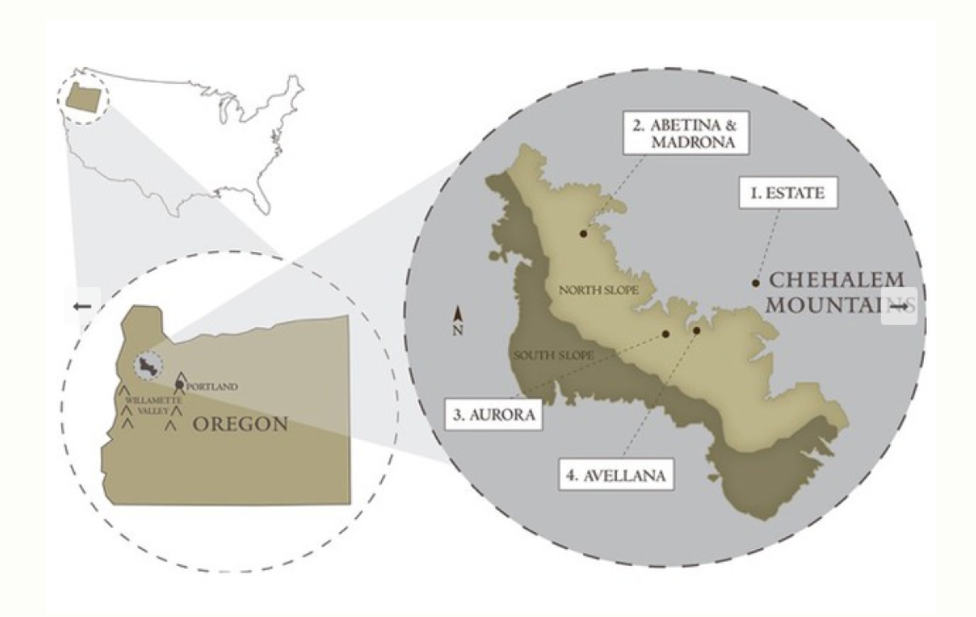
2018 Ponzi Abetina 2 Vineyard Chehalem Mountains Pinot Noir
14.0%
alc., pH 3.62, TA 0.53, 200 cases, $110. Fruit from Abetina 2 block at
Aurora Vineyard. 100% de-stemmed, 5-day cold soak, 7-day postfermentation
maceration, Aged 20 months in French oak barrels, 50% new.
Bottled unfined and unfiltered. Aged in bottle for 5 months before release.
·
Moderately dark garnet color in the glass. Beautifully perfumed with
aromas of dark cherry, tilled earth and truffle. Darker hued and darker
fruited in a mid-weight style featuring flavors of black cherry, purple grape,
blackberry, cinnamon spice, dark chocolate, and vanilla. The moderately
firm tannic spine moderates the fruit load. The texture reminds one of silk
pajamas. An extremely persistent grand cru finish is exhilarating. Over time
in the glass, the wine builds in hedonistic pleasure offering a charming
spiciness. When tasted two days later from a previously opened bottle, the
wine woke up the mouth with dreamy goodness.
Score: 97
Weber Vineyard/Ana Vineyard
Owner: Arthur Weber met David Lett in the mid-1960s at Oregon State University and he became deeply
interested in the potential of the Oregon wine industry. In 1970, Arthur and Vivian Weber traveled to Oregon to
talk to David Lett. While searching for Lett’s home, they came upon Jim and Loie Maresh instead. Jim and Loie
sold the Webers a nearby plot of 21 acres in the Dundee Hills in 1972. In 1976, their neighbor Nita Moyer sold
them an additional 65 acres that bordered their existing acreage. In 2001, The Webers sold about 21 acres of
the original vineyard including 2.75 acres of Pinot Noir to Andy and Adria Humphreys who were long-time
Weber Vineyard managers and the Humphreys renamed their portion Ana Vineyard. The Weber Vineyard was
to the east and Ana Vineyard to the west. The Humphreys resold their acreage to Holloran Vineyard Wines
who constructed a new winery on the property. Weber Vineyard is currently owned by Vivian Weber.
Location: The south side of Worden Hill Road in the Dundee Hills AVA. The vineyard is adjacent to Winderlea, Arcus
and Maresh vineyards.
Planting: 2.76 acres of own-rooted Riesling were planted in 1975 and 2.75 acres of own-rooted Pinot Noir were planted in 1976. From
1976 to 1988, the Webers planted 35 acres of Pinot Noir, Chardonnay, and Gewúrztraminer and sold the
grapes. The Weber Vineyard currently consists of 21.28 planted acres.
Pinot Noir scion: Own-rooted Pommard acquired from Dick Erath.
Own-rooted Pinot Noir vines at Weber Vineyard
Soil: Red, volcanic Jory.
Vines: The original Pinot Noir planting is at the top of the east-sloping hillside. The entire vineyard is east-facing
and is positioned at the bottom of a geographical bowl that opens up only to the south making it a cool
vineyard in a warm area. Weber Vineyard sits down the hill a quarter of a mile from Maresh Vineyard and
receives plenty of morning sun from its east-facing slope. The original vine spacing was 9' x 6'.
Farming: Organic practices. Biodynamic preparations were initiated in 2018. Dry-farmed.
Winery clients: Weber Vineyard: Arterberry Maresh (old vines), Cameron, Erath, J. Christopher, Kelley Fox,
Patricia Green Cellars (Pommard clone planted in 1983 at the top of the east-sloping hillside), Oak Knoll, Rex
Hill, R. Stuart (own-rooted Pommard clone planted in 1985), Stephen Goff, and Winderlea. Ana Vineyard:
Hazelfern, Trathen Hall.
Old vines bottlings: Winderlea Weber Vineyard Pinot Noir, Winderlea also sourced from Ana Vineyard in
the past), Arterberry Maresh Weber Vineyard and an Old Vines blend with Maresh Vineyard, and Patricia
Green Cellars Weber Vineyard Pinot Noir (1983 planting). Holloran Ana Vineyard Pinot Noir.
Of interest: The vine age and clones at Weber and Maresh vineyards are similar but the personality of the fruit
is surprisingly different given the closeness of the two locations. Maresh Vineyard fruit is pretty, red, and high toned
while Weber’s fruit is dark, earthy, savory and sultry.
2017 Winderlea Weber Vineyard Dundee Hills Pinot Noir
13.1% alc., $60. Own-rooted Pommard clone from 1976
plantings.
·
Moderately light garnet color in the glass. Earthbound
nose that adds the fruit aroma of dark cherry reduction
sauce. The flavors replicate the aromas in a mid-weight style
that exhibits excellent harmony. Easy to like with very fine
backing tannins and a polished demeanor. The finish is
unbelievably long.
Score: 93
2019 Arterberry Maresh Weber Vineyard Dundee Hills Pinot Noir
13.0% alc., $69. Only .48 tons per acre
from old vines in this vintage.
·
Moderate garnet color in the glass.This wine exhibits significant oak overlay even
from an opened bottled tasted 36 hours later. There is a core of deeply flavorful cherry and blackberry fruit but
it is overwhelmed by aggressive barrel treatment. There is significant tannin that is probably barrel in origin and
is reflected in the astringent finish.
Score: 88
2019 Patricia Green Cellars Weber Vineyard Dundee Hills Pinot Noir
13.2% alc., $48. 100% de-stemmed
after early pick. Aged in 8% new oak. Pinot Noir sourced from a section of the vineyard planted in 1983.
·
Moderately dark garnet color in the glass. Aromas of blackberry, white pepper, tilled earth, toast, and espresso.
Earth-dusted black cherry and blackberry fruit flavors backed by toasty oak. This wine has a savory and gamey
wildness character that attracts. Unchanged when sampled the following day from a previously opened bottle.
Score: 91
2010 Winderlea Ana Vineyard Dundee Hills Pinot Noir
13.1% alc.. Own-rooted Pommard Pinot Noir dating
to 1976 and some Dijon 777.
·
Moderate garnet color in the glass. A wow! nose offering soaring aromas of
cherry, baking spice and sandalwood. The mid-weight array of red fruits are framed by a touch of tannin and
excellent acidity. The wine is surprisingly fresh after 11 years and only showing a mild aged patina. The finish is
remarkably long. Fans of aged Pinot Noir will be delighted with this wine.
Score: 94
2018 Trathen Hall Ana Vineyard Dundee Hills Pinot Noir
13.8% alc., 50 cases, $45. Old vine composition
unknown.
·
Moderately light garnet color in the glass. Aromas of red cherry and strawberry with a floral and stem
note. Light to mid-weight flavors of cherry and strawberry that have good mid-palate presence and a long,
black cherry driven riff on the finish. There is good harmony with mollified tannins and a good cut of acidity.
Score: 92
